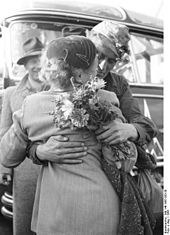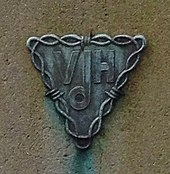Association of returnees, prisoners of war and members of missing persons in Germany
The Association of Returnees, Prisoners of War and Members of Missing Persons in Germany e. V. ( VdH ) was an umbrella organization of the many local associations that existed from 1950.
Purpose and organization
The Heimkehrerverband (VdH) represented the interests of German and Austrian former prisoners of war of the Second World War , returnees , late returnees and their relatives.
The VdH drew attention to the soldiers and displaced persons who were still in captivity at the time and supported the returnees and late returnees in their reintegration into society, and advocated peace and freedom .
The Austrian Homecoming Association, founded in 1957, emerged from the "Interest Association of Former Prisoners of War".
The VdH drew attention to the unimaginable need, misery and despair of the partially uprooted and traumatized returnees. Many former prisoners died only a few years after their return from the physical and psychological consequences of the war.
Clarification of the fate of missing persons
Over a million former German soldiers are missing, many fates cannot be clarified to this day. For a returnees meeting in Germany in Hanover, relatives of missing persons had submitted pictures that were exhibited in the exhibition halls so that the returnees who took part could help clarify their fates. On the basis of 45,000 images, 1,400 missing fates were clarified on site. The submitted images were passed on to the tracing service of the German Red Cross in Munich on July 22, 1955, after the meeting was over .
State support
The Federal Republic of Germany, as the legal successor to the German Reich , created the legal basis for compensation for those affected with the Homecoming Act .
The Returnees Act of June 19, 1950 provided for training allowances on return after May 8, 1946. Anyone who returned after December 31, 1947 was entitled to preferential placement or preferential employment in the public service. October 30, 1951 was the cut-off date for entitlement to discharge allowance and transitional allowance. Compensation was granted for the time spent in captivity beyond December 31, 1946 ( Prisoner of War Compensation Act as amended on February 4, 1987). When returning home after September 30, 1948, special tax allowances were recognized.
While compensation of up to DM 12,000 was paid in the Federal Republic of Germany , these people received no compensation in the GDR . After German reunification in 2007 was Returnee Compensation Act decided on 1 July 2008, it came into force. Those living at the time received a maximum of 1,500 euros. The association found support in the then CDU member of the Bundestag Hartmut Büttner and the Staßfurt mayor Martin Kriesel.
Regional Association of Bavaria
The regional association of Bavaria was conceived as a generation association when it was founded . This meant that no more returnees than those from the Second World War should be accepted into the association, as otherwise the work for reconciliation and peace would be in vain. With this restriction the extinction of the association was already given when it was founded. The Bavarian State Association of the VdH ended its work on December 31, 2007.
literature
- Wolfdietrich Kopelke: Freedom without Fear: Ten Years of the Homecoming Association , Sager-Druck, Berlin 1960 and self-published, Bad Godesberg 1960.
- Birgit Schwelling: Homecoming - Remembrance - Integration. The association of returnees, the former prisoners of war and the West German post-war society. Schöningh, Paderborn / Munich / Vienna 2010, ISBN 978-3-506-76921-3 . ( Review by H-Soz-Kult )
Web links
- Association of returnees, prisoners of war and members of missing persons in Germany eV (VdH). Archived from the original on December 4, 2010 ; accessed on October 7, 2015 . on the side of theFederal Association of Senior Citizens Organizations
- Falk Rockmann: Homecoming Association dissolves at the end of the year ... In: Volksstimme . October 22, 2009, accessed on October 7, 2015 (dissolution of VdH Staßfurt in October 2009).
Individual evidence
- ↑ Thomas Kühne: Review of Birgit Schwelling: Homecoming - Remembrance - Integration. Paderborn / Munich / Vienna 2010. In: Historical magazine . Vol. 293, No. 3, 2011, p. 864 f.
- ↑ 45,000 photos handed over to missing persons. In: Suchdienst-Zeitung No. 14/6 of July 31, 1955.
- ↑ Internet site of the DRK tracing service





